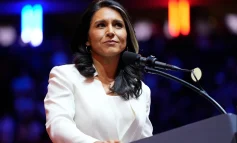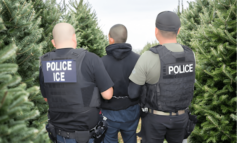BURLINGAME, Calif.— Israel’s first prime minister David Ben Gurion once said about displaced Palestinian refugees “the old will die and the young will forget.”

|
|
Mariam El Shafei, 16, lost an eye during the Dec. 2008-Jan. 2009 bombardment of Gaza. She was brought to the U.S. by the Palestinian Children’s Relief Fund. El Shafei spoke in the San Francisco area Feb. 6 during a commemoration of the attacks. PHOTOS: Ramsey El-Qare |
A San Francisco area crowd gathered at Burlingame Recreation Center on Feb. 6 to continue calls for peace and independence and to commemorate the Gaza bombardment that began on Dec. 27, 2008, killing 1,434 Palestinians and 13 Israelis over three weeks.
Over 500 people, a crowd of Arab, African, White, Asian, Hispanic, Jewish and Native Americans, came together for the event.
“Before there was Israel, we were Palestinian, and now we are still Palestinian,” said Eyad Kishawi, one organizer of the event. “Despite how many children you kill, torture or displace, the young will grow and struggle for liberation.”
The event included resistance music, poetry and dance, but also served as a forum for moving forward as a community.
Dr. Haidar Eid, a professor of English literature at Al-Aqsa University in Gaza, spoke to the group via phone, urging continued activism and speaking about a lack of continued media coverage of struggles in Gaza.

|
|
American Indian Movement member Tony Gonzales plays a traditional drum and reminds the audience that they are on Ohlone land. Gonzales spoke on solidarity between Palestinian and American Indian communities during the San Francisco-area commemoration of last year’s Gaza attacks. |
Co-founder of the International Solidarity Movement, Huwaida Arraf, said the purpose of the event was “to commemorate Gaza and strategize how we’re going to stand up in the face of this military machine trying to destroy us.”
Arraf is currently fundraising and organizing to send boats of food and medical supplies to Gaza. Barbara Lubin of the Berkeley, California-based Middle East Children’s Alliance, also announced that her organization is fundraising for building water systems for Gaza school children.
Another supporter, San Francisco Supervisor Tom Avalos, emphasized that he’s looking at introducing legislation for boycotting Israel goods in San Francisco.
“There’s a blockade on Gaza and Palestinians, but there is also a blockade on hearts and minds,” he said. “It’s a propaganda war. If people in the U.S. knew what was really going on, they would say no to providing weapons to Israel. We need the truth, but our media does not have that truth.”
A message that seemed to especially motivate the audience came from Sunrise Deli and Café owner Khaldoun Ramadan. [See Q&A with Ramadan below]
“We’ve been seeing what happened to the people in Gaza tonight… What should we do as Americans to support our people in Gaza? There is an individual need on each one of us to boycott Israeli products,” said the San Francisco deli owner. “It’s not enough to watch films and hear speeches. You go to work the next day as if nothing happened; especially for Palestinians, it is extremely important not to buy or sell Israeli products.”
One of the many non- Arab attendees, Elazar Friedman, echoed the messages heard throughout the commemoration.
“It’s important for Jewish activists to give support to the Palestinian people,” he said. “Jews are also a people who have suffered, and this is all the more reason why we, as Jews, should speak out.”
Dr. Rabab Abdulhadi, professor of the Arab and Muslim Ethnicities and Diaspora Program at San Francisco State University and a former University of Michigan-Dearborn professor, said the involvement of youth and of Gazans relating direct accounts of their experiences made the event special.
“This event had a really important theme,” she said. “It is not truly felt unless you have living examples, unless the kids are doing it… That is critical and very encouraging.”
Palestinian American restaurateur supports Israeli divestment
SAN FRANCISCO — Khaldoun Ramadan, owner of Sunrise Deli and Café, is a stern businessman, but manages to keep a friendly disposition, greeting his customers with a smile. Ramadan, who is of Palestinian origin from the town of Malha, just outside Jerusalem, has been living in the U.S. since 1977. He studied at Wayne State University in Detroit.

|
|
Khaldoun Ramadan, owner of Sunrise Deli and Café in San Francisco, refuses to sell Israeli-made goods at his business. He said human rights advocates have a responsibility to express opposition to occupation through boycott. |
He spoke with TAAN guest contributor Suzanne Manneh to discuss his thoughts on boycott further.
TAAN: How did you start divesting?
Ramadan: I have never sold any products made in Israel. Six years ago, when I first took over, there were a few goods on the shelf I noticed were products of Israel. I immediately took them off the shelf and contacted my distributor in Los Angeles to order more Middle Eastern groceries. I said I would only sell Arab products and told him, “if you send anything for me to sell that is made in Israel, even if it does not say product of Israel, I will find out and stop dealing with you.”
TAAN: Several Arab and Palestinian nationals feel strongly about strengthening the divestment movement, but what are your personal views?
Ramadan: In my opinion, selling any Israeli products is equivalent to being a collaborator for Israeli occupation. I was shocked when I found out some of our merchants are selling Israeli products. It shocked me even more that Palestinians are buying these products, without feeling they are doing anything wrong. Part of the job is to divest. It’s not enough to say we feel sorry for the massacres, for Palestinians losing their land to the settlers.
TAAN: How have your customers reacted?
Ramadan: Well, first of all, 90 percent, if not more, of my regular customers are (non-Arab) Americans. There have been times where some asked me if I carry Israeli products. I do not have signs up about it or anything, but when they ask, I tell them that I have never sold Israeli products and never will. There have not been many problems about it. There was one confrontation from a customer, but she left.
But there are also people, merchants—regardless of ethnic or religious background — who disagree with divestment and fear for their business.
For any merchant to sell Israeli made products shows a high level of greed. Here in the U.S. for any product, you can find 10 different brands. Why sell that one made in Israel? Some say if they remove the Israeli products (they ask themselves) “How will I survive?” They think they cannot survive. That is a lie. We have a lot of different alternatives here that are just as good.
TAAN: Yet, especially amongst some in the Jewish community, there is a misperception about the message of divestment.
Ramadan: I think it depends on loyalty. If they support Israeli occupation, why would I deal with them? If their religion is Jewish, but they support human rights and for Palestinians to have human rights, I’ll have no problem with them. I will sit down and be friends with them. Boycotting Israeli products in not boycotting Jewish people.
TAAN: What do you envision as next steps?
Ramadan: It’s not enough to keep talking about the civility of the occupation; everyone knows it’s killing children, elders, demolishing homes. It’s not enough to show a movie or a slide show about it. It’s a long, long struggle, but we need to educate the masses. You go to work the next day and forget. It’s our duty to find alternative products for them. There should also be pressure put on merchants by the community: “If you don’t stop carrying this (Israeli) product we will not shop here.” We need something that produces results.






Leave a Reply